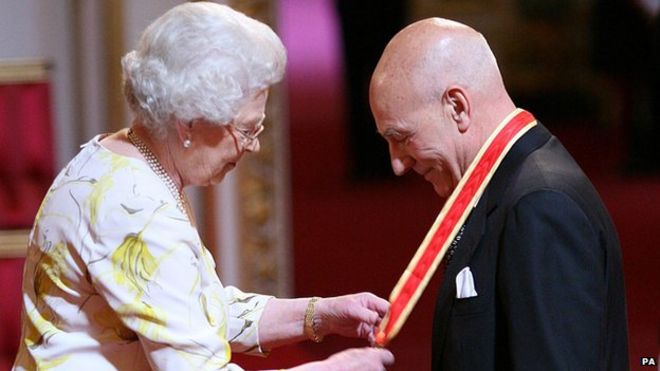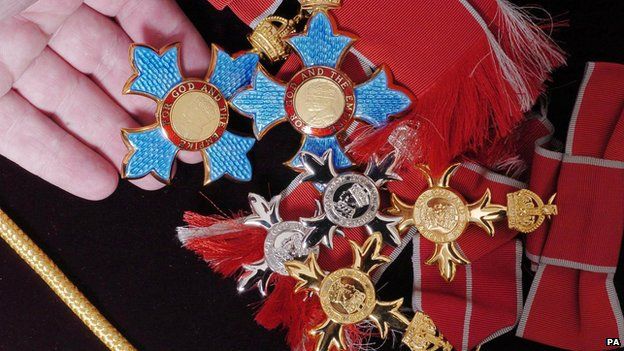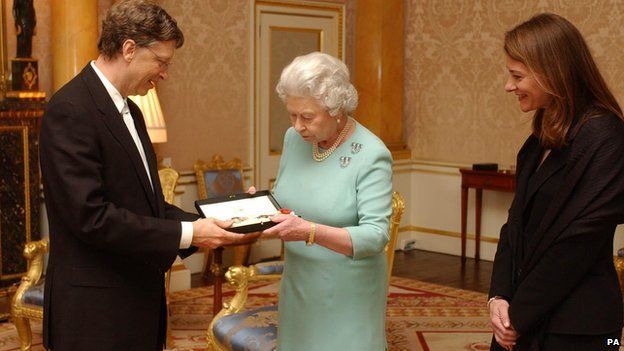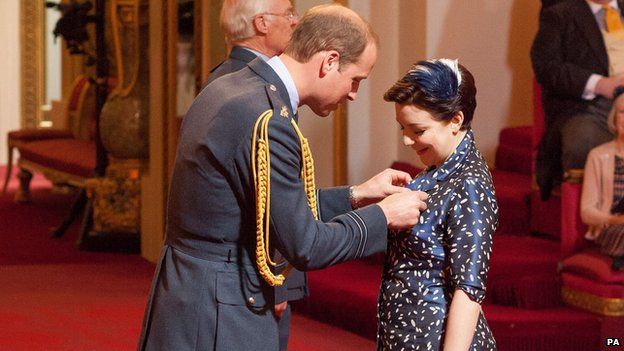 PA
PA
British honours are awarded on merit, for exceptional achievement or service.
The UK honours system is overseen by the Cabinet Office Honours and Appointments Secretariat.
The Foreign Office has responsibility for the Diplomatic Service and Overseas List which recognises service overseas, or service in the UK with a substantial international component.
UK nationals or citizens from the 15 Commonwealth realms such as Australia, Canada and Jamaica can be nominated for an honour.
Honorary awards for foreign nationals are recommended by the foreign secretary.
Orders for chivalry are made after a personal decision by the Queen.
The honours list consists of knights and dames, appointments to the Order of the British Empire and gallantry awards to servicemen and women, and civilians.
Nominations, submitted either by government departments or by members of the public, are divided into subject areas and assessed by committees comprising independent experts and senior civil servants.
Their assessments are passed to a selection committee that produces the list, independently of government, that is submitted to the Queen through the prime minister.
The Queen informally approves the list and letters are sent to each nominee. Once a nominee accepts the proposed honour, the list is formally approved.
The honours are published in the official Crown newspaper, the London Gazette, twice a year - at New Year, and in mid-June on the date of the Queen's official birthday.
The Central Chancery of the Orders of Knighthood at St James's Palace then arranges investitures for the recipients to be presented with their medals by the Queen or other members of the Royal Family.
 PA
PA
Private nominations, made by individuals or by representatives of organisations to the Cabinet Office, traditionally make up about a quarter of all recommendations.
POLITICAL HONOURS
The honours list does not cover peerages. Starting in May 2000, peers nominated by political parties have been vetted by the House of Lords Appointments Commission. The commission is involved in making recommendations for non-party affiliated peerages.
An outgoing prime minister also has the right to draw up a dissolution or resignation honours list on leaving office, which is then submitted to the Cabinet Office for approval.
In recent years, however, political donations made by a number of recipients have become the subject of media scrutiny.
In a November 2011 response to a parliamentary committee's inquiry into the honours system, the Cabinet Office noted that all candidates for senior awards are "checked against the lists of donations maintained and made public by the Electoral Commission.
"The Main Honours Committee must satisfy itself that a party political donation has not influenced the decision to award an honour in any way; the committee must be confident that the candidate would have been a meritorious recipient of an honour if he or she had not made a political donation."
A Parliamentary and Political Services Committee comprising a majority of independent members and the chief whips of the three major parties was set up in 2012 to considers honours for politicians and for political service.
 PA
PA PA
PA
But in the same year the Commons Public Administration committee urged the government to review the way the whole honours system is administered. It called on ministers to set up independent bodies to nominate recipients for awards and decide when they should be withdrawn, suggesting the government's "lack of willingness to clarify and open up the process" was damaging public confidence.
Honours have sometimes been forfeited. The Honours Forfeiture Committee considers cases where a recipient's actions "raise the question of whether they should be allowed to continue to be a holder of the honour".
The Queen's art adviser Anthony Blunt, stripped of his knighthood in 1979 after being revealed as a Soviet spy, and jockey Lester Piggott, who lost his OBE after he was jailed in 1987 for tax fraud, are among those to have had honours annulled.
In 2012, former Royal Bank of Scotland boss Fred Goodwin - heavily criticised over his role in the bank's near-collapse in 2008 - had his knighthood removed, while entertainer Rolf Harris was stripped of a CBE in March 2015, following his conviction for indecent assault.
Meanwhile, a list of 277 people who had turned down honours between 1951 and 1999, and who had since died, was made public by the Cabinet Office following a BBC Freedom of Information request. The list included the authors Roald Dahl, J G Ballard and Aldous Huxley, and the painters Francis Bacon, Lucien Freud and LS Lowry.
TYPES OF HONOURS
KNIGHTS AND DAMES
The honour of knighthood comes from the days of medieval chivalry, as does the method used to confer the knighthood: the accolade, or the touch of a sword by the sovereign.
Although Knights Bachelor do not comprise an order of chivalry, knighthood is a dignity which has its origins in Britain in Saxon times. They are styled "Sir" (except for clergymen who do not receive the accolade) and their wives "Lady".
Women receiving the honour are styled "Dame" but do not receive the accolade.
The honour is given for for a pre-eminent contribution in any field of activity.
The rank of Knight Commander (KBE) or Dame Commander (DBE), Order of the British Empire, commonly appears on the Diplomatic Service and Overseas list. It can be given to Britons based abroad or in an honorary capacity to foreign nationals.
THE ORDER OF THE BATH
The Order of the Bath is an order of chivalry and was founded in 1725 for service of the highest calibre. The order has a civil and military division and is awarded in the following ranks: Knight Grand Cross (GCB), Knight Commander (KCB) and Companion (CB).
The Order takes its name from the symbolic bathing which in former times was often part of the preparation of a candidate for knighthood.
ORDER OF ST MICHAEL AND ST GEORGE
This Order was founded by King George III in 1818 and is awarded to British subjects who have rendered extraordinary and important services abroad or in the Commonwealth. Ranks in the Order are Knight or Dame Grand Cross (GCMG), Knight or Dame Commander (KCMG or DCMG) and Companion (CMG).
ORDER OF THE COMPANIONS HONOUR
This is awarded for service of conspicuous national importance and is limited to 65 people. Recipients wear the initials CH after their name.
ORDERS OF THE BRITISH EMPIRE
King George V created these honours during World War I to reward services to the war effort by civilians at home and servicemen in support positions.
The ranks are Commander (CBE), Officer (OBE) and Member (MBE).
They are now awarded for prominent national or regional roles and to those making distinguished or notable contributions in their own specific areas of activity. The honour of an MBE, in particular, can be given for achievement or service in the community.
BRITISH EMPIRE MEDAL
The medal was founded in 1917 and was awarded for "meritorious" actions by civilians or military personnel, although the recipients did not attend a royal investiture.
It was scrapped in 1993 by former Conservative Prime Minister John Major, as part of his drive towards a "classless" society.
Nearly two decades on, Prime Minister David Cameron has announced its revival, and from 2012, to coincide with the Queen's Diamond Jubilee, about 300 will be awarded annually to community volunteers.
ROYAL VICTORIAN ORDER
By 1896, prime ministers and governments had increased their influence over the distribution of awards and had gained almost total control of the system. Therefore, Queen Victoria instituted The Royal Victorian Order as a personal award for services performed on her behalf.
Today this honour is still awarded in recognition of services to the royal family. The ranks are Knight or Dame Grand Cross (GCVO), Knight or Dame Commander (KCVO or DCVO), Commander (CVO), Lieutenant (LVO) and Member (MVO).
ROYAL VICTORIAN MEDAL
Associated with the Royal Victorian Order is the Royal Victorian Medal which has three grades: gold, silver, and bronze. The circular medal is attached to the ribbon of the Order.
More than one grade may be held by the same person and the medal may be worn along with the insignia of the Order itself.
ROYAL RED CROSS
Founded in 1883 by Queen Victoria, the award is confined to the nursing services. Those awarded the first class are designated "Members" (RRC): those awarded the Second Class are designated "Associates" (ARRC).
It is said that the suggestion for the founding of this decoration was made to Queen Victoria by Florence Nightingale.
QUEEN'S POLICE MEDAL
This is awarded for distinguished service in the police force.
QUEEN'S FIRE SERVICE MEDAL
This honour is given to firefighters who have displayed conspicuous devotion to duty.




















